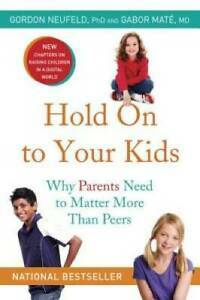Take a photo of a barcode or cover
200 reviews for:
Hold On to Your Kids: Why Parents Need to Matter More Than Peers
Gabor Maté, Gordon Neufeld
200 reviews for:
Hold On to Your Kids: Why Parents Need to Matter More Than Peers
Gabor Maté, Gordon Neufeld
slow-paced
You would be hard pressed to find someone who has read more about attachment than me. There are some truths in this book, but nothing was backed up with research, and all of the arguments were couched in a bizarre paranoid/privileged backdrop. Truly a weird experience. I’d like to think some of the issues are due to it being published in what feels like another age. I finished because I’m not a quitter.
challenging
informative
reflective
slow-paced
informative
slow-paced
Uff-da. There was good information in here, it was just repeated as nauseam. It also seemed like he was preaching to the choir, but offered few practical suggestions.
If you only allow 30 minutes a day of tv for your child and wish to gain control over them, this is the parenting book for you. Bonus if you are threatened by their friends who are also children.
informative
slow-paced
Right, where to start with a book I loved and hated in equal parts? I definitely would have DNF’D early on if @bookcaseofbarnes hadn’t recommended - this book has some important things to say about ‘attachment parenting’ as your child moves on from infanthood (the stage where I feel these theories are more well known), and I found the concept of peer attachment a valid and useful way to look at the issues arising in the modern world for parents. But fuck me does it cloak it in warped nostalgia for a parenting past it poorly defines, and contradicts as the book goes on. There’s also I deep vein of cultural conservatism that leads to selective evidence /lack of nuance on many points. It felt at times not like a text from academics but a media think piece, with its scare tactic use of extreme examples, and vagary re what age of child they were taking about - 0-18 (or 25) is a very wide spectrum.
To be fair to the authors, this might all be an issue of the book being North American and largely from the 90s. Plus, given some of jarring between what’s said re many issues I do wonder if this was written with a certain audience in mind and not in the authors completely authentic voice.
Overall, I’m miffed that when it was updated to reflect modern technology someone didn’t come in and edit it the fuck back to the key messages: it’s normal and healthy for children to be closest to family, not friends, what they really need isn’t discipline (in the most commonly used interpretation) but a rounded secure relationship with a few key mature caregiving adults, examples of how relationships can deteriorate and how to try and prevent/rebuild, how you can end up accidentally outsourcing your parenting to peers with all the goodwill in the world, and why it can be so disastrous.
If you can see the woods for the trees this is a brilliant book for promoting reflection on how you parent / encouragement to keep getting back on the horse of attachment led parenting with growing kids. It’s about understanding some socio-biological principles and fitting them to your family, not a hard set of rules.
(My last criticism needs caveats, as it may not be true if the book, but the audio does not demonstrate referenced evidence for a lot of what it says.)
I keep putting off reviewing this because it's too daunting.
This book has been on my Kindle forever, at the recommendation of a primarily foster/adoptive parenting group. I started it back when I got it and put it down pretty quickly -- it didn't seem like it was for me. Unfortunately, a lot of the language used sets off some fundamentalist/evangelical bells in my head, and I think it will for others with that type of background. I don't think it necessarily is meant to in this context, but it's something to be aware of and from the other side, I would say that it's worth pushing through if you can.
Quarantine put me in the perfect place to push through. I kept seeing this book recommended, and at the same time I've found myself frustrated, annoyed and confused by so much of the discussion of kids missing their friends and play dates and social outings during quarantine. I totally respect and understand that for older kids. But as a mom of still pretty young kids, it didn't resonate at all. It didn't resonate with my kids the way they are, and it didn't resonate with myself as I remembered feeling when I was a young child. I had some friends I enjoyed playing with, but at that age, my world didn't revolve around them. I also felt like the emphasis on social get togethers for young kids was weird and misplaced, but didn't fully have words for it.
So I picked this book up again, because I thought it would put words to that. And did it ever.
Unfortunately sometimes the words are off-putting. It's hard to keep them in the context of this book alone and remove all of the external baggage, in order to actually read what the author intended. But apart from that, and viewed through the context of "this is what a deficit in secure attachment looks like" -- which is what the book is really describing -- it is absolutely stunning. It describes pieces of things I hadn't yet been able to explain or understand. It validates a lot of my intuition, which is that the focus on "friends" for young children who still desperately need to form secure attachments to caretakers is weird. It explained why I could trust my dog to stay near me but not my children.
There were some missteps -- a lot of it feels dated, or maybe that's because I feel like kids today are more hopeful and promising than we give them credit for -- but underneath some of the cultural things that irritated me I was highlighting nonstop, because it was JUST. SO. ACCURATE. and explanatory in working through specific results and symptoms of attachment challenges.
This book has been on my Kindle forever, at the recommendation of a primarily foster/adoptive parenting group. I started it back when I got it and put it down pretty quickly -- it didn't seem like it was for me. Unfortunately, a lot of the language used sets off some fundamentalist/evangelical bells in my head, and I think it will for others with that type of background. I don't think it necessarily is meant to in this context, but it's something to be aware of and from the other side, I would say that it's worth pushing through if you can.
Quarantine put me in the perfect place to push through. I kept seeing this book recommended, and at the same time I've found myself frustrated, annoyed and confused by so much of the discussion of kids missing their friends and play dates and social outings during quarantine. I totally respect and understand that for older kids. But as a mom of still pretty young kids, it didn't resonate at all. It didn't resonate with my kids the way they are, and it didn't resonate with myself as I remembered feeling when I was a young child. I had some friends I enjoyed playing with, but at that age, my world didn't revolve around them. I also felt like the emphasis on social get togethers for young kids was weird and misplaced, but didn't fully have words for it.
So I picked this book up again, because I thought it would put words to that. And did it ever.
Unfortunately sometimes the words are off-putting. It's hard to keep them in the context of this book alone and remove all of the external baggage, in order to actually read what the author intended. But apart from that, and viewed through the context of "this is what a deficit in secure attachment looks like" -- which is what the book is really describing -- it is absolutely stunning. It describes pieces of things I hadn't yet been able to explain or understand. It validates a lot of my intuition, which is that the focus on "friends" for young children who still desperately need to form secure attachments to caretakers is weird. It explained why I could trust my dog to stay near me but not my children.
There were some missteps -- a lot of it feels dated, or maybe that's because I feel like kids today are more hopeful and promising than we give them credit for -- but underneath some of the cultural things that irritated me I was highlighting nonstop, because it was JUST. SO. ACCURATE. and explanatory in working through specific results and symptoms of attachment challenges.
inspiring
reflective
medium-paced
challenging
emotional
hopeful
informative
inspiring
reflective
slow-paced
Šī ir viena no lietderīgākajām grāmatām par bērniem un to audzināšanu, ko esmu lasījusi. Tā fokusējas uz to, cik svarīga ir bērnu un pusaudžu drošā piesaiste (secure attachment) ar vecākiem (vai citiem pieaugušajiem), kā to izveidot un uzturēt. Bet galvenais grāmatas vadmotīvs ir - kas notiek ar mūsu bērniem, ja mēs šo piesaisti neveidojam/pazaudējam. Piesaistei ir jābūt, un ja tā nav ar vecākiem, tā rodas ar draugiem, kas veido situāciju, kad bērnus audzina bērni. Grāmatā detalizēti aprakstītas sekas šādai situācijai sabiedrībā - vardarbība, apcelšana skolā (bullying), agrais sekss, emocionālā norobežošanās no pasaules, vecāku autoritātes zaudēšana, grūtības un neieinteresētība mācībās.
Klausoties to, man regulāri galvā bija "Klik, klik, klik" un vēl viens notikums bērnībā/pusaudža gados ir nostājies savā vietā. Vēl viena man pašai nesaprotamā mana rīcība vai uzvedība izskaidrota. Vēl viena kļūda skaidra (manis pašas vai vecāku), ko es varu saprast un tāpēc varu vieglāk piedot.
Nav viegli mainīt audzināšanas stilu un metodes, kas nāk no saviem vecākiem, sabiedrības uzskatiem un kādreiz iedomātām idejām. Bet šī grāmata ar savu spēcīgo pamatojumu un ļoti praktiskiem padomiem ir kā glābšanas riņķis - palīdz noturēties arī tad, kad ir grūti.
Iesaku visiem vecākiem un ne tikai. Arī tiem, kuri grib saprast savus vecākus. Un arī sevi pašu.
Klausoties to, man regulāri galvā bija "Klik, klik, klik" un vēl viens notikums bērnībā/pusaudža gados ir nostājies savā vietā. Vēl viena man pašai nesaprotamā mana rīcība vai uzvedība izskaidrota. Vēl viena kļūda skaidra (manis pašas vai vecāku), ko es varu saprast un tāpēc varu vieglāk piedot.
Nav viegli mainīt audzināšanas stilu un metodes, kas nāk no saviem vecākiem, sabiedrības uzskatiem un kādreiz iedomātām idejām. Bet šī grāmata ar savu spēcīgo pamatojumu un ļoti praktiskiem padomiem ir kā glābšanas riņķis - palīdz noturēties arī tad, kad ir grūti.
Iesaku visiem vecākiem un ne tikai. Arī tiem, kuri grib saprast savus vecākus. Un arī sevi pašu.





